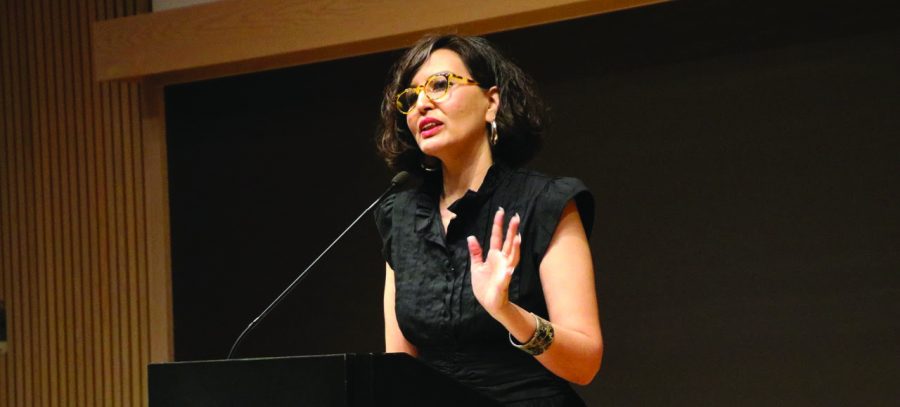Living Writers: Layli Long Soldier’s Poetry Collection
Poet, artist and citizen of the Oglala Lakota nation Layli Long Soldier visited Colgate on Thursday, October 3, as the fourth presenter in the Living Writers series.
Long Soldier read poems from her poetry collection “WHEREAS,” winner of the National Book Critics Circle Award and the PEN/Jean Stein Book Award, and talked about her visual art. The main focus of her work is the preservation of her Lakota identity in the face of injustice against her people.
“WHEREAS” is in part a reaction to an apology to Native Americans signed by President Obama in 2009. While a nationally acknowledged apology seemed to be a good thing in reconciling with the past mistreatment of Native Americans, Long Soldier explained that the reality is that the apology was watered down.
“No Native American leaders were explicitly apologized to, there were little to no announcements of the apology, and there was even a disclaimer attached stating that nothing in the document supports legals claims against the United States or settles claims,” Long Soldier said.
While acknowledging the past traumas that the United States government inflicted on Native Americans is a step in the right direction, lack of political action to reconcile those misdeeds is essentially putting a Bandaid on a bullet wound. Long Soldier’s poetry works to encapsulate these traumas through written words.
The poems in WHEREAS deal with other content such as, Long Soldier’s experience as a mother, her language and living in a country that dealt injustice to her people. The broad collection of all Native Americans into one group when they are in fact many cultures is another issue she addresses.
“When I use the word Lakota, when I say I am Lakota, that’s a very different feeling than if I say ‘I’m Native American or American Indian.’ That carries a whole different kind of history than to say I am Lakota,” Long Soldier said.
She also talked about her take on a traditional Lakota star quilt, an Owinja, that is typically given to others on special occasions, and how it ties in with her own poetic practice.
Long Soldier has written poems in unique ways on each of the diamonds that make up the star. Read from top to bottom, the structure allows the viewer to form their own poem. Each line has a selection of different words and phrases, starting from one at the top, to many in the middle, and again to one at the bottom.
The poems speak to the interconnectedness of the Lakota people, expressed through the phrase, “mitakuye oyasin,” meaning, “all are related,” which has been appropriated by many other groups. Long Soldier drew the poems from interviews she conducted with her own people about the meaning of the phrase.
Long Soldier also expressed some of her personal experiences concerning the representation of her people. While looking at photos of models when buying clothes with her daughter, her daughter asked, “how come they never have any Natives?”
People are often ignorant of Native American issues. For example, the taxi driver who drove her to Colgate asked her about her what percent Native American she is, a taboo question in her culture.
“He just doesn’t know, and that’s hard. He’s just one of many, many people,” Long Soldier said.
Colgate students of all class years attended the event, including senior creative writing major Lydia Culp who commented on the way Long Soldier’s Living Writers appearance affected her interpretation of the poetry.
“She’s a really pensive reader. She has such a presence on stage, I felt like it made her poetry better,” said Culp.
“Something that stood out from our class discussion was the ongoing struggle with duality. It is hard to imagine writing in your opressor’s native language, but Long Soldier finds ways to fight back with form and multiplicity of a word’s meaning,” senior Eric Fishbin said.









